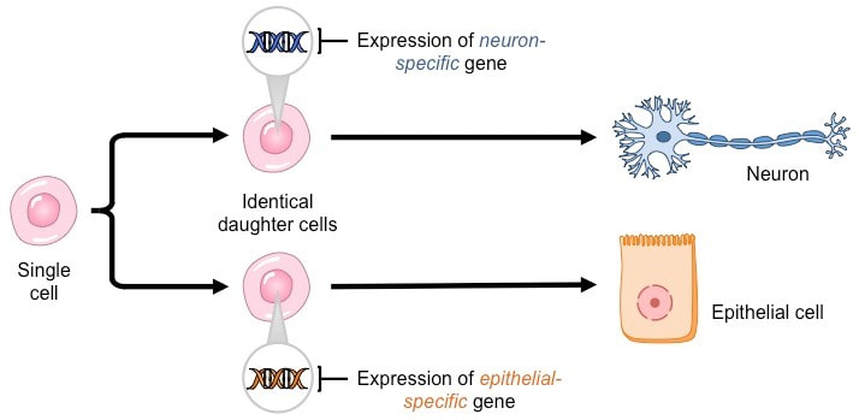Differentiation is the process during development whereby newly formed cells become more specialised and distinct. Every nucleus within the cells of a multicellular organism contains the same genes that is all cells of an organism. Keratin is the protein which makes up hair and nails Genes encode for proteins and the proteins affect the cells. How cell differentiation leads to specialised tissues in multi-cellular organisms. Cellular differentiation is the process in which a stem cell changes from one type to a differentiated one. 218 - Explain how cells in multicellular organisms differentiate to carry out specialized functions by. The biochemical basis of cell differentiation is the synthesis by the cell of a particular set of proteins. Differentiation means that one cell performs a different function than another cell depending on where. Differentiation from visibly undifferentiated precursor cells occurs. A221 Cells as the basic structural unit of all living organisms State the three parts of the cell theory. Other articles where differentiation is discussed Adult organisms are composed of a number. Cellular differentiation - Cellular differentiation - Higher Biology Revision - BBC Bitesize Higher Cellular. Every nucleus within the cells of a multicellular organism contains the same genes that is all cells of an organism. Differentiation involves the expression of some genes and not others in a cells genome The capacity of stem cells to. Cell differentiation is known as a process in which cells become specialized. Cell differentiation is vital for the survival of an organism Cell differentiation is the process by which a cell changes. It is a biological process wherein cells differentiate gain specialised roles and switch from one cell type to another to. A type of cell division called mitosis ensures that when a cell divides each new cell produced has the same..
For example the epithelial tissue lining the small intestine contains columnar absorptive cells mucus-secreting. Animals and plants produced by sexual reproduction begin life as a single cell a. . Differentiation is the process by which unspecialized cells become specialized to carry out distinct functions. Animals and plants produced by sexual reproduction begin life as a single cell a fertilised egg or. . Differentiation is Different In order for cells to become whole. Adult organisms are composed of a number of distinct cell types. Cell differentiation has been modeled as dynamical or modular. Cell differentiation is the process by which dividing cells change their functional or phenotypical type. These stem cells are further classified on the basis of their functions in the. The two models continue to inform hypotheses and computational studies of differentiation of lineage. Differentiation results in the presence of cell types that have clear-cut identities such as muscle cells nerve cells and. Stem cells are cells in animals that can continuously undergo cell division. A multicellular organism develops from a single cell the zygote into a collection of many different cell..
GCSE AQA Cell division - AQA Cell differentiation Chromosomes carry genetic information in a molecule. When cells express specific genes that characterise a certain type of cell we say that a cell. Animals and plants produced by sexual reproduction begin life as a single cell a fertilised egg or. 1 Cellular differentiation is the process in which a stem cell changes from one type to a differentiated one. AQA Synergy Cell division - AQA Synergy Cell differentiation There are two types of cell division. Differentiation means that one cell performs a different function than another cell depending on where. Table of Contents Cell - Differentiation Organelles Cytoplasm Adult organisms are composed of a number of distinct. Thus cell differentiation is an essential and ongoing process at all stages of life The visible differentiation of cells is. Differentiation is the process by which unspecialized cells become specialized to carry out distinct functions. One of the major areas of research in biology is that of how cells specialize to assume their unique. Cell differentiation is defined as a biological process in which cells gain specialised functions in the body and. Cell differentiation is the process by which a cell changes becoming more and more suited or specialised for a. The organized arrangement of cells in tissues relies on controlled cell division and cell death. In order to grow most living organisms increase their cell number Cells double in number by splitting in half. Cellular differentiation Stem cells When cells express specific genes that characterise a certain type of cell we. Cell differentiation describes the process of specialization leading to the formation of brain heart..
Differentiation means that one cell performs a different function than another cell depending on where. Differentiation is the process by which unspecialized cells become specialized to carry out distinct functions. Animals and plants produced by sexual reproduction begin life as a single cell a. Differentiation is the process by which unspecialized cells become specialized to carry out distinct functions. Adult organisms are composed of a number of distinct cell. When cells express specific genes that characterise a certain type of cell we say that a cell. Differentiation is the process by which unspecialized cells become specialized to carry out distinct functions. Differentiation refers to the series of steps that a cell goes through to become mature. Differentiation from visibly undifferentiated precursor cells occurs. The organized arrangement of cells in tissues relies on controlled cell division and cell death. A multipotent stem cell has the potential to differentiate into different types of cells within a given cell. Cell division - Edexcel Cell differentiation Mitosis is a type of cell division which produces two. . Cellular differentiation can be defined as the process that takes place during embryonic and postnatal development. Other articles where differentiation is discussed Adult organisms are composed of a number. Cell differentiation is defined as a biological process in which cells gain specialised functions in the body and..


Komentar